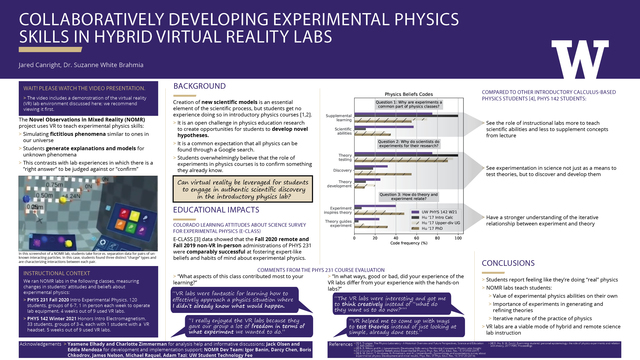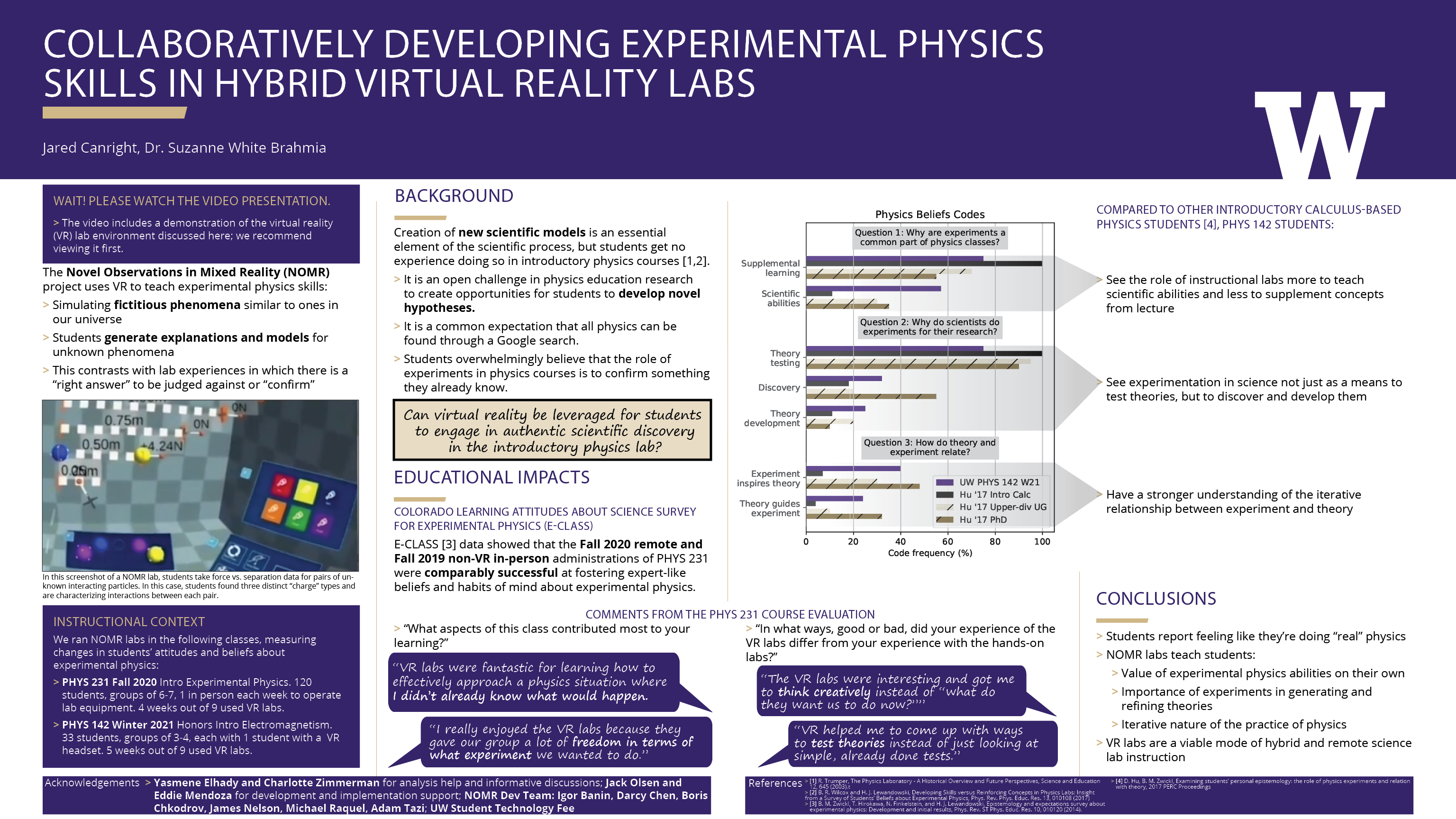Skip to main contentResource added 
In this work, we discuss findings from the administration of NOMR labs in a sophomore-level experimental physics course of ~120 students at UW in Fall 2020. Emergent insights from our hybrid approach to running VR labs suggest that targeted VR experiences can enable unique improvements to synchronous group collaboration activities in remote learning. Our analysis of students’ development of experimental physics skills can inform the design and administration of further VR labs for physics and adjacent scientific disciplines that create opportunities for authentic practice of scientific model development at the early undergraduate level. Comparison of E-CLASS data taken in Fall 2020 and in the Fall 2019 in-person, non-VR administration of the same course suggests that VR labs can provide a pedagogically comparable equivalent to an in-person lab experience.
In this work, we discuss the administration of NOMR labs in a sophomore-level experimental physics course of ~120 students at UW in Fall 2020, emergent insights from a hybrid approach to running VR labs, and our measurements of students' shift in experimental physics thinking over the course. Insights from our findings will inform the design and future use of VR labs in remote contexts and other educational application areas.
Collaboratively Developing Experimental Physics Skills in Hybrid Virtual Reality Labs

Full description
Video Presentation
Authors:
- Jared Canright, Physics, UW Seattle
- Suzanne White Brahmia, Physics, UW Seattle
Abstract:
The Novel Observations in Mixed Reality (NOMR) project in the UW Physics Education Research Group applies modern virtual reality technology to teach experimental physics skills by simulating phenomena that do not exist in our universe. By exploring and characterizing unheard-of and Google-proof physical phenomena, students gain authentic experience developing scientific models. Like practicing scientists, students generate explanations for unknown phenomena, contrasting with typical lab experiences in which there is a “right answer” to be judged against or “confirm.” We postulate that NOMR labs can develop students’ ability to generate hypotheses and develop mathematical models to describe new physical phenomena, fostering expert-like beliefs and habits of mind about experimental physics. By examining students’ lab reports through the lens of the Investigative Science Learning Environment (ISLE) rubrics, we assess NOMR labs’ impact on students’ experiment design and model generation skills. Likewise, the Colorado Learning Attitudes About Science Survey for Experimental Physics (E-CLASS) administered at the beginning and end of the course tracks students’ shifts in beliefs and habits of mind about experimental physics.In this work, we discuss findings from the administration of NOMR labs in a sophomore-level experimental physics course of ~120 students at UW in Fall 2020. Emergent insights from our hybrid approach to running VR labs suggest that targeted VR experiences can enable unique improvements to synchronous group collaboration activities in remote learning. Our analysis of students’ development of experimental physics skills can inform the design and administration of further VR labs for physics and adjacent scientific disciplines that create opportunities for authentic practice of scientific model development at the early undergraduate level. Comparison of E-CLASS data taken in Fall 2020 and in the Fall 2019 in-person, non-VR administration of the same course suggests that VR labs can provide a pedagogically comparable equivalent to an in-person lab experience.
In this work, we discuss the administration of NOMR labs in a sophomore-level experimental physics course of ~120 students at UW in Fall 2020, emergent insights from a hybrid approach to running VR labs, and our measurements of students' shift in experimental physics thinking over the course. Insights from our findings will inform the design and future use of VR labs in remote contexts and other educational application areas.
Poster PDF
View a PDF version of the poster in Google Drive to enlarge the image or download a copy.
Comments
The presenter for this poster will be available to respond to comments during Poster Session 2 on April 20, 3:45-4:30 p.m.Comments
to view and add comments.
Annotations
No one has annotated a text with this resource yet.
- typeImage
- created on
- file formatjpg
- file size2 MB
- publisherUniversity of Washington
- rights


